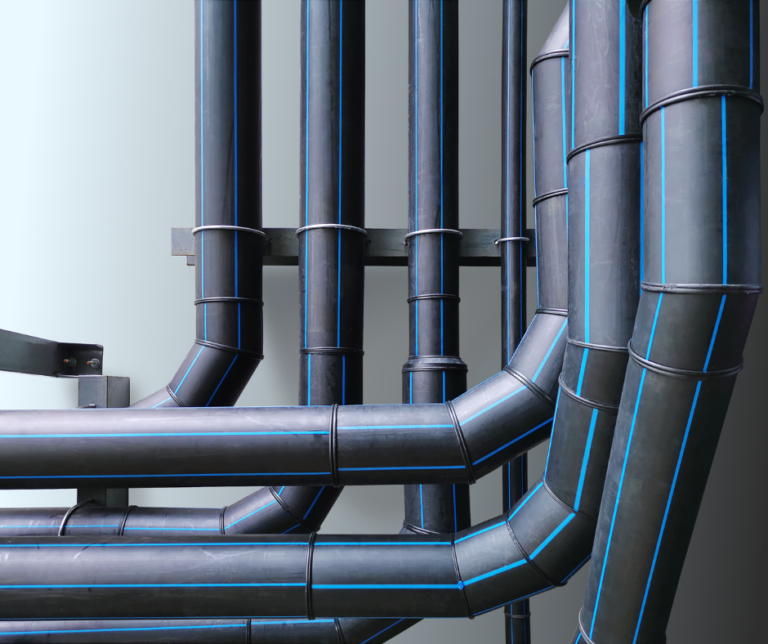Practical Overview to hdpe pipe fittings Midland TX and Their Uses
Recognizing the Trick Conveniences of HDPE Pipe for Water and Wastewater Management
The use of HDPE pipe in water and wastewater monitoring presents countless benefits that warrant consideration. Its remarkable toughness and lengthy life-span make it a recommended choice for many tasks. Furthermore, the product's resistance to deterioration and chemical damage enhances its integrity in various environments. The benefits prolong beyond simply longevity and resistance. American Plastics HDPE Pipe for Oilfield. Discovering its cost-effectiveness and ecological impact discloses even a lot more engaging factors for its extensive fostering in modern-day facilities
Extraordinary Durability and Long Life

HDPE pipe attracts attention for its phenomenal longevity and durability, making it a recommended selection in water administration systems. Constructed from high-density polyethylene, these pipelines can hold up against substantial pressure and tension, guaranteeing trusted efficiency over time. Their robust nature enables them to sustain extreme ecological problems, including temperature variations and soil activities, which can create other materials to fail.
The life expectancy of HDPE pipes often goes beyond 50 years, offering an economical option for communities and industries alike. In addition, the material's lightweight homes simplify installment, reducing labor prices and timeframes. This durability minimizes the need for constant repair services or replacements, better boosting its financial charm.
In water administration applications, the integrity of HDPE pipes implies less disruptions and enhanced solution connection, making them important to sustainable infrastructure growth. The mix of toughness and longevity strengthens HDPE's duty as a keystone in reliable water monitoring solutions.

Resistance to Corrosion and Chemical Damage
While lots of products catch deterioration and chemical damages gradually, HDPE pipelines display remarkable resistance, making them excellent for numerous water monitoring applications. This strength originates from the molecular structure of high-density polyethylene, which is inherently non-reactive and does not rust like metals or weaken from exposure to extreme chemicals. Consequently, HDPE is highly efficient in environments with hostile substances, such as wastewater systems that may consist of acids, bases, and organic solvents.
In addition, HDPE pipelines can hold up against ecological elements such as dirt level of acidity and saline problems, additionally improving their suitability for varied applications (custom hdpe pipe manufacturing Midland TX). Their ability to maintain architectural integrity gradually reduces the danger of leakages and failings, which is critical in ensuring the security and reliability of water distribution and wastewater monitoring systems. The resistance to deterioration and chemical damages substantially contributes to the total performance and durability of HDPE piping solutions.
Cost-Effectiveness and Financial Benefits
When thinking about the financial ramifications of water administration systems, the cost-effectiveness of HDPE pipelines becomes apparent. These pipes use reduced setup and maintenance prices contrasted to traditional materials like steel or concrete. Their lightweight nature streamlines transportation and installation, causing minimized labor expenses. Additionally, HDPE pipes exhibit a long life expectancy, frequently going beyond 50 years, which equates to fewer substitutes and long-lasting cost savings.
The resistance of HDPE to corrosion and chemical damages decreases the requirement for expensive repairs and substitutes. The pipelines likewise support reliable water circulation, reducing energy prices connected with pumping systems. By mitigating leaks and water loss, HDPE pipes add to considerable economic advantages for communities and markets alike. Overall, the preliminary financial investment in HDPE piping can produce substantial monetary returns over the life expectancy of the water monitoring system, making it a prudent choice for sustainable framework advancement.
Environmental Sustainability and Decreased Influence

Convenience and Flexibility in Setup
Due to their special homes, HDPE pipes supply impressive adaptability and adaptability in setup, making them ideal for a vast variety of applications. Their light-weight nature permits much easier handling and transport, decreasing labor costs and setup time. HDPE pipelines can be curved and shaped to fit numerous terrains and job demands, which is especially valuable in challenging atmospheres.
Additionally, their resistance to deterioration and chemical damages permits installation in diverse settings without the need for specialized safety coverings. The capacity to fuse joints develops a continuous, leak-free system, improving the total integrity and dependability of the setup. HDPE's adaptability also accommodates ground motion, minimizing the threat of damages in locations vulnerable to changing dirt. Overall, these attributes make HDPE pipelines not just flexible but likewise a recommended selection for water and wastewater monitoring systems.
Regularly Asked Inquiries
Just How Does HDPE Pipeline Contrast to PVC in Water Monitoring Applications?
HDPE pipe uses premium adaptability, resistance to corrosion, and toughness contrasted to PVC. Its lighter weight promotes much easier installation, while its lengthy life expectancy decreases replacement prices, making HDPE a preferred option in water monitoring applications.
What Is the Lifespan of HDPE Pipes Under Common Conditions?
Under typical problems, HDPE pipes can have a lifespan ranging from 50 to 100 years. Their sturdiness and resistance to deterioration add to their long-lasting performance in numerous applications, making them a reputable option for infrastructure.
Are HDPE Water Lines Recyclable After Their Life Span?
Yes, HDPE pipes are recyclable after their solution life. Texas hdpe pipe manufacturer. They can be refined and repurposed into brand-new products, greatly decreasing ecological effect and advertising sustainability within the market, making them an environmentally friendly selection for piping options
What Is the Installation Refine for HDPE Pipes?
The installation procedure for HDPE pipelines includes website preparation, trenching, pipe blend or mechanical joining, backfilling, and pressure screening. Appropriate techniques ensure a resilient and effective system for transporting water and wastewater successfully.
Can HDPE Pipes Be Utilized for Both Safe And Clean and Non-Potable Water Equipments?
Yes, HDPE pipes can be made use of for both potable and non-potable water systems. Their convenience, resilience, and resistance to rust make them ideal for numerous applications, ensuring risk-free and effective transportation of water in different contexts.